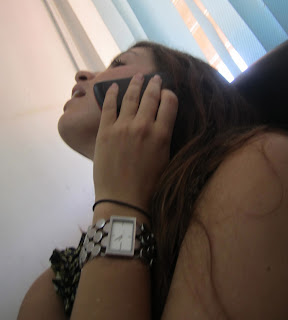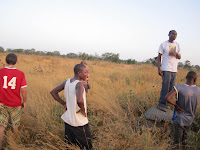Merry Christmas Everyone! This is my official Christmas Card to you all (it's been a while since I sent cards!).
There are no jingles, puns or catch crys from me, just well wishes and merryment! xxx
Tamale is not in the Christmas spirit as much as I am used to, but then again, who really likes Christmas carols and fake snow paint? Right now I am at work on Friday, staying back late because my boss insisted we finish the Annual Work Plan that we have been talking about doing since I arrived! I do love a good procrastination, guess it seems I'm learning from the best! The UN organisation next to me has left early, and there seems to be a rave party happening at the bank next door (techno beats coming up 3 stories to greet me), but it is a festive atmosphere regardless and I've done my part of work so really I'm just here for moral support and the fun! So take note: I'm not complaining, this is the life!
We had our staff Christmas party on Monday, the highlight being the agenda (that yes, it was followed, but I have not received the minutes yet);
I just heard that for our dinner tonight someone is busy putting together an agenda for it now!
I am heading south tomorrow for a beachside Christmas. Spending it in Busua where I hear you can actually swim in the ocean! It will be a welcome sight, the dusty, desert air isn't the best appetiser here in Tamale.
So a Merry Christmas to you all, I hope everyone has a safe and happy holiday. It's been a great year, with an interesting 6 months ahead for me, hopefully the same for each and every one of you. You will have your Christmas and New Years in Australia before me in Ghana, so double the fun! Please send me an email if you are so desired - tell me a story or two - or a photo or 3....
To the Family and my Friends: Thanks for all the love and support, I can feel it all the way across the world! Sending mine back, and maybe a few presents too!
Photos: You use what you have: Water Sachet Christmas tree! Was a great Crafternoon making it! Thanks to mum for all the presents to put under it!!
and a house garden breakfast - eggs from our chickens, tomatoes from the garden.....YUM!
There are no jingles, puns or catch crys from me, just well wishes and merryment! xxx
Tamale is not in the Christmas spirit as much as I am used to, but then again, who really likes Christmas carols and fake snow paint? Right now I am at work on Friday, staying back late because my boss insisted we finish the Annual Work Plan that we have been talking about doing since I arrived! I do love a good procrastination, guess it seems I'm learning from the best! The UN organisation next to me has left early, and there seems to be a rave party happening at the bank next door (techno beats coming up 3 stories to greet me), but it is a festive atmosphere regardless and I've done my part of work so really I'm just here for moral support and the fun! So take note: I'm not complaining, this is the life!
We had our staff Christmas party on Monday, the highlight being the agenda (that yes, it was followed, but I have not received the minutes yet);
 | |
| Like I said earlier, an agenda is vital for all meetings - even of the party variety |
I am heading south tomorrow for a beachside Christmas. Spending it in Busua where I hear you can actually swim in the ocean! It will be a welcome sight, the dusty, desert air isn't the best appetiser here in Tamale.
So a Merry Christmas to you all, I hope everyone has a safe and happy holiday. It's been a great year, with an interesting 6 months ahead for me, hopefully the same for each and every one of you. You will have your Christmas and New Years in Australia before me in Ghana, so double the fun! Please send me an email if you are so desired - tell me a story or two - or a photo or 3....
To the Family and my Friends: Thanks for all the love and support, I can feel it all the way across the world! Sending mine back, and maybe a few presents too!
Photos: You use what you have: Water Sachet Christmas tree! Was a great Crafternoon making it! Thanks to mum for all the presents to put under it!!
and a house garden breakfast - eggs from our chickens, tomatoes from the garden.....YUM!




















































